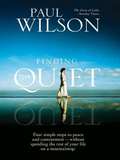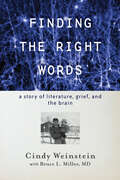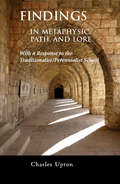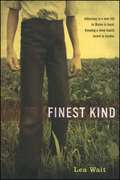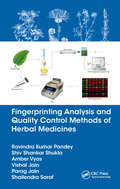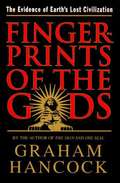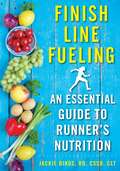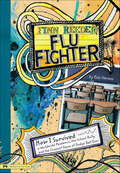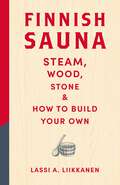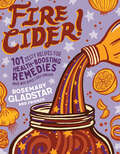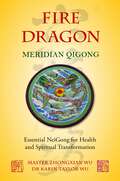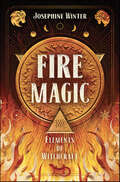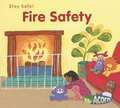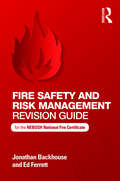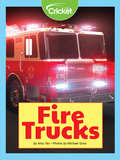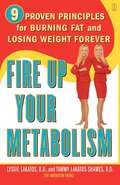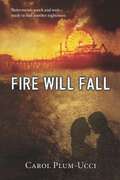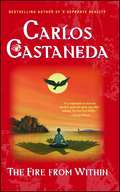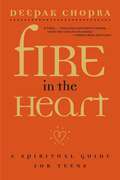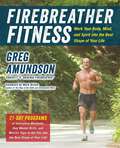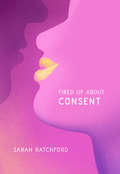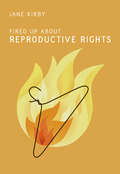- Table View
- List View
Finding the Quiet: Four simple steps to peace and contentment - without spending the rest of your life on a mountain top
by Paul F. WilsonA powerful book to help you move from chaos into tranquillity, from hecticness into peace, and from stress into joy-written by the man known as "the guru of calm. "The Quiet" is a place where you can't be touched by the noise and tensions of the modern world. A place where, no matter what's happening around you, you have time and space to breathe. Some people spend a lifetime of meditation practice and spiritual studies searching for it. The practices in Finding the Quiet are based on four simple steps that transform the way you feel and what you get out of life. Following these techniques can lead to:· peace of mind· clarity of thought· emotional stability· physical well-beingWe are also including A Piece of the Quiet, which provides fast and easy highlights for when you need a quick moment of calm. Whether you are a novice at meditation or a lifetime practitioner, the strategies presented in Finding the Quiet are powerful tools to take you where you want to be.
Finding the Right Words: A Story of Literature, Grief, and the Brain
by Cindy WeinsteinThe moving story of an English professor studying neurology in order to understand and come to terms with her father's death from Alzheimer's.In 1985, when Cindy Weinstein was a graduate student at UC Berkeley, her beloved father, Jerry, was diagnosed with early-onset Alzheimer's disease. He was fifty-eight years old. Twelve years later, at age seventy, he died having lost all of his memories—along with his ability to read, write, and speak. Finding the Right Words follows Weinstein's decades-long journey to come to terms with her father's dementia as both a daughter and an English professor. Although her lifelong love of language and literature gave her a way to talk about her grief, she realized that she also needed to learn more about the science of dementia to make sense of her father's death. To write her story, she collaborated with Dr. Bruce L. Miller, neurologist and director of the Memory and Aging Center at the University of California, San Francisco, combining personal memoir, literature, and the science and history of brain health into a unique, educational, and meditative work. Finding the Right Words is an invaluable guide for families dealing with a life-changing diagnosis. In chapters of profound and sometimes humorous remembrance, Weinstein relies on literature to describe the shock of her father's diagnosis and his loss of language and identity. Writing in response to Weinstein's deeply personal narrative, Dr. Miller describes the neurological processes responsible for the symptoms displayed by her father. He also reflects upon his own personal and professional experiences. In a final chapter about memory, Weinstein is able to remember her father before the diagnosis, and Miller explains how the brain creates memories while sharing some of his own. Their two perspectives give readers a fuller understanding of Alzheimer's than any one voice could.
Findings: In Metaphysic, Path, & Lore
by Charles UptonThe Traditionalist or Perennialist School of metaphysics, esoterism, and comparative religion, 'founded' by René Guénon and Ananda K. Coomaraswamy, and carried on by such figures as Frithjof Schuon, Titus Burckhardt, and Martin Lings, produced a body doctrine of rare depth and comprehension, effectively re-introducing to the modern and postmodern West the perennial wisdom of the human race. For the past twenty years, the author has immersed himself in these teachings, and made his own modest contribution to them. The three fundamental pillars of 'classical' Traditionalism/Perennialism are, (1) That God has sent more than one revelation to humanity, established more than one version of the Path by which the spiritual traveler may return to Him, each revelation being a providential branch of the great tree known as the Primordial Tradition; (2) That while certainly there is a Sophia Perennis, a unanimous and perennial wisdom given by God and transmitted from the dawn of humanity down to the present day, there cannot in our time be a Religio Perennis, a single universal doctrine and practice based on the Primordial Tradition; consequently the seeker must seek his vehicle among one of the living orthodox revealed traditions, not in some "revival" of a universal faith, or the fragments of it, from ages dead and gone; (3) Given that the present cycle of manifestation is rapidly approaching dissolution, the seeker's perennial duty to break identification with the system of collective egotism known as This World, and give his allegiance to God Alone, must now be seen in light of the fact that This World is about to end. Some presently associated with the Traditionalist/Perennialist School, however, no longer hold to "classical Traditionalism/Perennialism" as I have defined it. I have written this book partly to articulate some of the basic tenets of the first two generations of the Traditionalist School, so as to provide interested readers with a relatively stable point of reference that will hopefully allow them to see just how, and how much, that School has changed in the first years of the 21st century.
Finest Kind
by Lea WaitWHAT CAN YOU DO WHEN YOU'RE TWELVE YEARS OLD AND YOUR WORLD IS FALLING APART? It's 1838. Jake's father has lost his job and his savings. Hearing of work in Maine, the family leaves their large home in Boston and heads north, taking with them a few furnishings—and a deep family secret. In Maine they find only a dirty, isolated farmhouse, and a job for Father that takes him away from home. "I'll have to depend on you," Jake's mother tells him. But how can Jake find food? How can he prepare for the dangerous cold of a Maine winter? How can he protect his mother—and his family's secret? Slowly, Jake learns the ways to survive, catching game and storing food for the long winter months. Nabby McCord, whose family also has a secret, helps him. So does Granny McPherson, who may be a witch. But when it comes to earning the money they need, Jake knows he's on his own. He shows his determination as the winter approaches, but does he have what it takes to bring his family together to face the future—and their past? Finest Kind is the powerful story of a boy who is forced to become a man and to learn the truth about courage, friendship, and secrets.
Fingerprinting Analysis and Quality Control Methods of Herbal Medicines
by Parag Jain Shiv Shankar Shukla Vishal Jain Ravindra Kumar Pandey Amber Vyas Shailendra SarafDue to the increase in the consumption of herbal medicine, there is a need to know which scientifically based methods are appropriate for assessing the quality of herbal medicines. Fingerprinting has emerged as a suitable technique for quality estimation. Chemical markers are used for evaluation of herbal medicines. Identification and quantification of these chemical markers are crucial for quality control of herbal medicines. This book provides updated knowledge on methodology, quality assessment, toxicity analysis and medicinal values of natural compounds.
Fingerprints of the Gods: The Evidence of Earth's Lost Civilization
by Graham HancockOn the great mysteries of nature, history, and man.
Finish Line Fueling: An Essential Guide to Runner's Nutrition
by Jackie DikosDelicious recipes and essential nutrition tips for runners.
Finn Reeder, Flu Fighter: How I Survived a Worldwide Pandemic, the School Bully, and the Craziest Game of Dodge Ball Ever
by Eric StevensFinn Reeder's English teacher is out sick, and the sub assigns his class to start writing a journal. Over the course of the next month, a flu epidemic ravages Finn's school.
Finnish Sauna: Steam, Wood, Stone and How to Build Your Own
by Lassi A. LiikkanenAs the old Finnish proverb has it: First build the sauna. Then the house.More and more people around the world are rediscovering an ancient secret to wellbeing, relaxation and stress relief: the humble sauna. By gently raising the heart rate and relaxing muscles, the magical steam that rises from the heated stones - what Finns call löyly - has improved quality of life in the Nordic region for millennia.In this practical guide, leading global expert Lassi Liikkanen teaches us how to plan, build and maintain a new sauna, with detail on insulation, panelling, and bench construction, and uses the examples of an indoor electric sauna and an outdoor sauna cabin with a wood-burning heater. Along the way, you will learn the traditions and science of sauna, and for the first time Dr Liikkanen introduces his history of Finnish sauna as defined by four eras.Whether you're already planning to build your own, or just beginning to learn of the health benefits of sauna, this book is the perfect introduction to löyly and the very Finnish art of living well. Prepare to embrace the deep sense of calm and connection that comes from this simple marriage of steam, wood and stone.
Finnish Sauna: Steam, Wood, Stone and How to Build Your Own
by Lassi A. LiikkanenAs the old Finnish proverb has it: First build the sauna. Then the house.More and more people around the world are rediscovering an ancient secret to wellbeing, relaxation and stress relief: the humble sauna. By gently raising the heart rate and relaxing muscles, the magical steam that rises from the heated stones - what Finns call löyly - has improved quality of life in the Nordic region for millennia.In this practical guide, leading global expert Lassi Liikkanen teaches us how to plan, build and maintain a new sauna, with detail on insulation, panelling, and bench construction, and uses the examples of an indoor electric sauna and an outdoor sauna cabin with a wood-burning heater. Along the way, you will learn the traditions and science of sauna, and for the first time Dr Liikkanen introduces his history of Finnish sauna as defined by four eras.Whether you're already planning to build your own, or just beginning to learn of the health benefits of sauna, this book is the perfect introduction to löyly and the very Finnish art of living well. Prepare to embrace the deep sense of calm and connection that comes from this simple marriage of steam, wood and stone.
Fire Cider!: 101 Zesty Recipes for Health-Boosting Remedies Made with Apple Cider Vinegar
by Rosemary GladstarFor more than 30 years, best-selling author and popular herbalist Rosemary Gladstar has been touting the health benefits of fire cider — a spicy blend of apple cider vinegar, onion, ginger, horseradish, garlic, and other immune-boosting herbs. Her original recipe, inspired by traditional cider vinegar remedies, has given rise to dozens of fire cider formulations created by fans of the tonic who use it to address everyday ills, from colds and flu to leg cramps and hangovers. Fire Cider! is a lively collection of 101 recipes contributed by more than 70 herbal enthusiasts, with energizing versions ranging from Black Currant Fire Cider to Triple Goddess Vinegar, Fire Cider Dark Moonshine, and Bloody Mary Fire Cider. Colorful asides, including tribute songs and amusing anecdotes, capture Gladstar&’s passionate desire to pass along the fire cider tradition. This publication conforms to the EPUB Accessibility specification at WCAG 2.0 Level AA.
Fire Dragon Meridian Qigong: Essential NeiGong for Health and Spiritual Transformation
by Zhongxian Wu Karin Taylor WuFire Dragon Meridian Qigong is a traditional Chinese internal alchemy method that embodies the spirit of the rising dragon, an auspicious symbol of transformation in Chinese culture. The form works directly on the acupuncture meridians, releasing areas of stagnation and bringing the physical and emotional body into a balanced state of well-being. This Qigong form implements special visualization and breathing techniques in addition to movements that imitate sparks arising from a bonfire and swirling upward like a spiraling dragon. Stoking our 'inner fire' melts away the 'ice', or the areas of blockage and disease, opens our energetic pathways and allows the smooth flow of Qi in our meridians. The Fire Dragon practice follows the traditional internal alchemy process, where Jing (essence) transforms to Qi (vital energy), Qi transforms to Shen (spirit), and Shen returns to Emptiness. Fire Dragon Meridian Qigong is a key Qigong form for those seeking healing from cancer and other significant health challenges, and is the practice the authors turned to in order to transform the grief over their son's death. The book provides background information and a detailed description of the form itself, illustrated with calligraphy, meridian drawings, and photographs throughout.
Fire Magic (Elements of Witchcraft)
by Josephine WinterHelp Your Magic Burn Brighter with the History, Lore, and Uses of FireBring the passionate element of fire into your practice with this captivating entry in Llewellyn's Elements of Witchcraft series. Featuring spells, rituals, recipes, and folklore, Fire Magic shows you how to fully harness the flame and add new meaning and energy to your life.Join author Josephine Winter on an illuminating exploration of fire and its many uses in witchcraft. Discover candle and bonfire magic throughout history, how fire is depicted in mythology, and fire-related celebrations for the sabbats. Learn about correspondences, sacred herbs and woods, and how to stay safe while honoring this element. Featuring guest contributors, fire deities, mythical beasts, crystals, and more, Fire Magic inspires you to reignite your passion for magic.
Fire Safety (Merit Badge Series)
by Boy Scouts of AmericaDetailed requirements for earning a merit badge in fire safety.
Fire Safety (Stay Safe)
by Sue BarracloughFire Safety What should you do if your clothes catch on fire? Read this book to find out--and learn all about fire safety! With colorful artwork and simple text, books in this series introduce children to safety principles in different contexts. In Fire Safety, children learn important fire safety rules and how to react in the event of a fire.
Fire Safety and Risk Management Revision Guide: for the NEBOSH National Fire Certificate
by Ed Ferrett Jonathan BackhouseThe Fire Safety and Risk Management Revision Guide: for the NEBOSH Fire Certificate is the perfect revision aid for students preparing to take their NEBOSH National Certificate in Fire Safety and Risk Management. As well as being a handy companion volume to the Fire Protection Association textbook Fire Safety and Risk Management: for the NEBOSH National Certificate in Fire Safety and Risk Management, it will also serve as a useful aide-mémoire for those in fire safety roles. The book: provides practical revision guidance and strategies for students; highlights the key information for each learning outcome of the current NEBOSH syllabus; gives students opportunities to test their knowledge based on NEBOSH-style questions and additional exercises; provides details of publically available guidance documents that students will be able to refer to. The revision guide is fully aligned to the current NEBOSH syllabus, providing complete coverage in bite-sized chunks, helping students to learn and memorise the most important topics. Throughout the book, the guide refers back to the Fire Safety and Risk Management textbook, helping students to consolidate their learning.
Fire Trucks
by Amy TaoFirefighter Greg has an important job to do–he helps people who are in danger of being hurt by fire. He has a lot of equipment to help him do his job. A computer inside the fire truck shows Firefighter Greg exactly which house to go to. Ladders, rigs, and tools help get the job done! Can you name other equipment that will be needed for Firefighter Greg to help others, and be safe? How can you be safe at your house to prevent fires?
Fire Trucks (Wild About Wheels)
by Nancy DickmannSmoke pours out of a window. Call 911. A fire truck is on its way! Fire trucks carry the equipment needed to put out fires and help people in emergencies. Young readers will find out about fire trucks, their main parts, and how these important vehicles are used.
Fire Up Your Metabolism
by Lyssie Lakatos Tammy Lakatos Shames"I can't loose weight because I have a terrible metabolism" You may not realize it, but you can take control of your metabolism. Identical twins and registered dietitians, Lyssie Lakatos and Tammy Lakatos Shames embarked on a twin study to determine precisely what does -- and doesn't -- increase the rate at which our bodies burn calories and fat. Their findings? Small changes have big results. The nine weight-loss principles -- and the 200 tips that help you incorporate them into your lifestyle -- in Fire Up Your Metabolism are surprisingly simple: Eat breakfast before you get to work. Learn which sugary snacks trump others (peanut M&Ms boost metabolism, but Twizzlers don't). Drink water, which is essential to burning calories. Always eat dinner, even if it's late. Focus on muscle building, not cardiovascular workouts. With Fire Up Your Metabolism, you won't have to avoid restaurants or follow a diet (though one is included if you like regimentation). The fatigue and distracting hunger that derail most dieters won't affect you because revving your metabolism is all about eating. You will enjoy breads and other carbohydrates. You will boost your metabolism with power proteins, including hamburgers, and avoid other proteins that bog you down. You will indulge in snacks you thought a dieter could never touch. Lyssie and Tammy's clients have experienced not only dramatic weight loss but also the thrill of having more energy than ever before. Now you, too, can rewire your metabolism to lose weight fast and forever.
Fire Will Fall
by Carol Plum-UcciShadowStrike poisoned the water of Trinity Falls two months ago. Now the Trinity Four, the teens most affected by the poison, have been isolated in a remote mansion under twenty-four-hour medical care while scientists on four continents rush to discover a cure. Meanwhile, U.S. operatives scour the world for the bioterrorists responsible for this heinous crime, as two teen virtual spies, also infected, hunt for the criminals on the Internet. The danger remains real—for ShadowStrike has every reason to pursue the Trinity Four, and their evil plan will unleash a new designer virus that’s even deadlier than the first.
Fire from Within
by Carlos CastanedaEach of Carlos Castaneda's books is a brilliant and tantalizing burst of illumination into the depths of our deepest mysteries. Like a sudden flash of light, like a bolt of lightning over the desert at night, each one shows us a world that is both alien and familiar--the landscape of our dreams. In The Fire from Within--possibly the author's most thought-provoking and unusual book--Carlos Castenda, under the tutelage of don Juan and his disciples, at last constructs the complete, stunning portrait of the sorcerer's world, bringing it to us in a fashion that is crystal clear and dizzying in its implications.
Fire in the Heart: A Spiritual Guide for Teens
by Deepak ChopraA fifteen-year-old boy is walking through a swirling fog on his way to school when a voice calls out, "Come here. We need to talk." Out of the mist emerges an old man with a white beard. He is a fantastic figure, as wizardly as Merlin, as wise as Socrates, as peaceful as Buddha. Whoever he is, the old man has appeared on that very day to change the boy's life. "You are old enough to learn about things," he says mysteriously. "And who is going to teach you but me?" The old man gives the boy four days of "soul training," a time of riddles, tricks, parables, and incredible twists that brings out surprising answers to each of four burning questions about spirituality: Do I have a soul? How do wishes come true? What is the supreme force in the universe? How can I change the world? "The old man with the white beard showed me the spiritual side of life," writes Deepak Chopra, "where real passion and excitement come from. So before you begin, take a deep breath. This story could turn out to be yours."
Firebreather Fitness: Work Your Body, Mind, and Spirit into the Best Shape of Your Life
by Greg AmundsonForge a powerful new path to fitness and health with Greg Amundson&’s Firebreather Fitness program and get into the best shape of your life physically, mentally, and spiritually.Former SWAT officer, DEA Special Agent, U.S. Army Captain, and founding CrossFit® athlete and coach, Greg Amundson is a globally recognized leader in functional fitness conditioning and anti-inflammatory foods and diet. Known as CrossFit&’s® &“original firebreather," Amundson shares his secrets, advice, and experiences that helped him forge his Firebreather Fitness, a fitness program of body, mind, and spirit. Amundson&’s Firebreather Fitness program will help you align your physical, mental, and spiritual training so you can gain strength, unlock potential, and live a high-performance, super-healthy life. In Firebreather Fitness you will find: Integrated 21-day training programs that include innovative workouts, key mental drills, and warrior yoga to get you into top condition Performance standards that keep your workouts challenging and let you compete with athletes on your level More than 40 exercises with clear technique photographs and advice Scaling options to make workouts easier or harder, depending on your level of fitness It takes more than a hard body to excel at work, in the gym, and in life. Firebreather Fitness folds in the cutting-edge mental toughness training and time-tested spiritual practices that guide Amundson and the athletes he coaches. Amundson&’s smart and effective guide to goal-setting, pain tolerance, honing purpose and focus, and exerting control over your mental state offer invaluable tools to help meet any challenge. Packed with practical advice, vetted training methods, and Amundson&’s guided workout programs, Firebreather Fitness is a must-have resource for athletes, coaches, law enforcement and military professionals, and anyone interested in pursuing the high-performance life.
Fired Up about Consent
by Sarah RatchfordAccording to the World Health Organization, one in three women will be sexually or physically assaulted in her lifetime. These rates are very similar for non-binary people and other feminized people, too. This is rape culture, and young adults are living through it here and now. Fired Up about Consent is a practical, survivor-informed primer for young people who want to learn how to build joyful, mutually satisfying sex lives and relationships. In these pages, author Sarah Ratchford defines rape and sexual assault, busts the myths behind toothless messaging and outdated advice, and provides sex-positive scripts on how to ask for and offer a clear, enthusiastic, and freely given “Yes!” Along the way, Ratchford touches on topics such as #MeToo, gender identity, masturbation, virginity, porn, sex work, reporting assault, and more, all through a radically inclusive and intersectional lens. The message is loud and clear: not only is consent sexy, it’s mandatory—and everyone deserves frank and empowering literacy around it. Only with empathy, compassion, and resistance can we move forward into a new culture of consent.
Fired Up about Reproductive Rights (Fired Up #2)
by Jane KirbyWhat is at stake in the fight for safe, legal, and accessible abortion services? And who benefits from our dark legacy of coercive sterilization, eugenics, and population control? Reproductive rights are rights that everyone should be fired up about! Decades after abortion was legalized and decriminalized in Canada, the US, and the UK, why are we still fighting for reproductive rights? Shattering the myth that the battle for reproductive rights has already been won, Fired Up about Reproductive Rights shows us the many ways our reproductive lives remain subject to state control. From the fight for safe, legal, and accessible abortion services to the fight against coercive sterilization, eugenics, and population control, threats to our reproductive control remain alive and well in our communities. Engaging with the reproductive justice framework advanced by women of colour, the book presents the fight for reproductive rights as contingent with other social justice issues, and forces us to grapple with the weaknesses of the feminist and reproductive rights movement as it exists. Accessible and engaging, this book gives readers the tools to understand–and fight against–contemporary threats to our reproductive rights.
